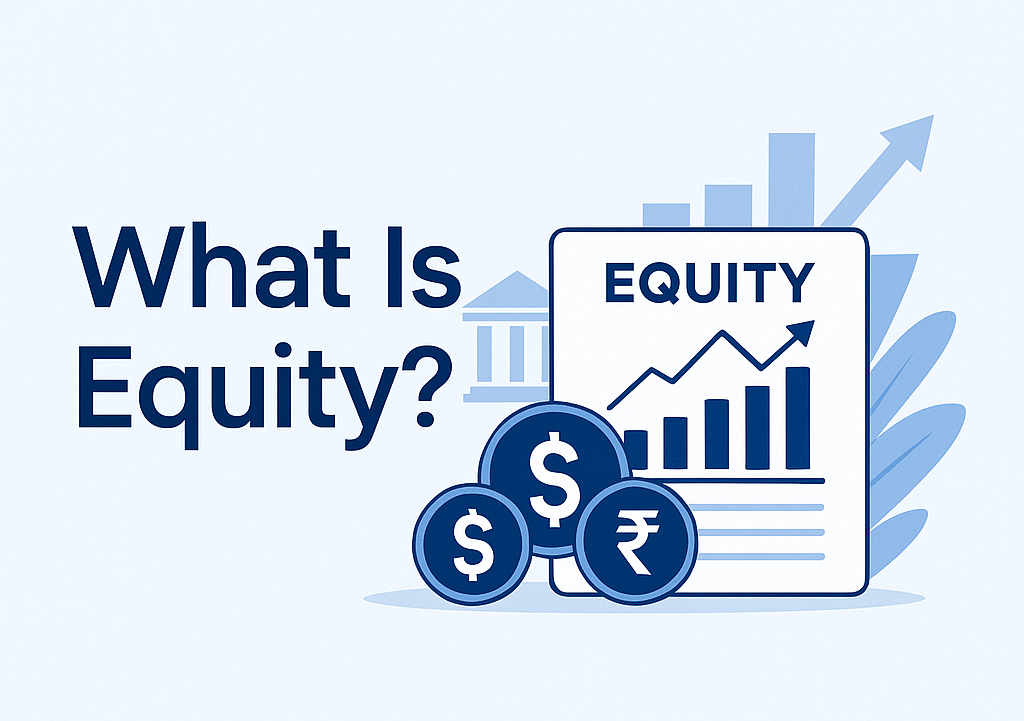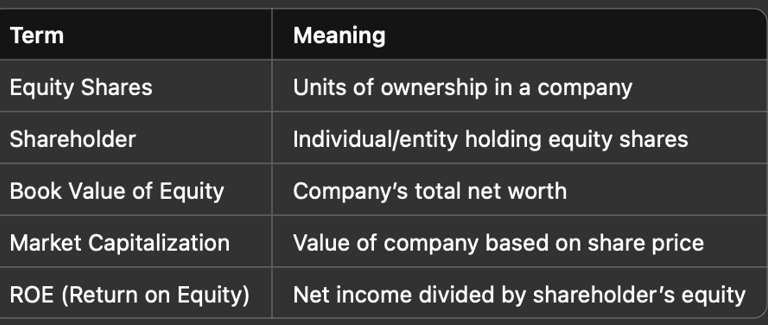What Is Equity? Complete Beginner’s Guide to Equity in Stocks and Business (2025)
3/30/20252 min read


What Is Equity? Understanding Equity in the Stock Market and Business (2025 Guide)
If you’re new to finance or investing, the term equity might seem complex at first. But understanding what equity is—and how it works—lays the foundation for making smarter decisions in the stock market, business valuation, and personal wealth creation.
In this blog, we break down equity in simple terms, explain the types of equity, and show how it applies to both investors and companies.
What Is Equity?
Equity refers to ownership. In the financial world, it means ownership in a company or asset, representing the portion of the asset that you truly own after deducting liabilities.
In the stock market, equity commonly refers to stocks or shares held by an investor in a company. When you buy shares of a company listed on the stock exchange, you’re essentially buying a piece of its equity.
Equity in Different Contexts
1. Equity in the Stock Market
When an individual holds equity in a public company, they own part of that business. The more shares you own, the greater your claim to the company’s assets, profits, and decision-making (through voting rights).
Example: If you own 100 shares of Infosys, you hold equity in Infosys.
2. Equity in Business Accounting
In business terms, equity is calculated as:
Equity = Assets – Liabilities
It represents the company’s net worth and is reported on the balance sheet. It can be further divided into:
• Owner’s Equity (for private businesses)
• Shareholder’s Equity (for public companies)
Types of Equity
• Common Equity: Ordinary shares that carry voting rights and dividends
• Preferred Equity: Shares with fixed dividends, but limited or no voting rights
• Private Equity: Investment in privately held companies
• Equity Mutual Funds: Funds that invest primarily in shares of companies
• Home Equity: Value of a homeowner’s interest in their property (real estate context)
Why Equity Matters for Investors
Understanding equity helps you:
• Participate in company growth through shareholding
• Build long-term wealth via capital appreciation and dividends
• Make informed investment decisions based on equity value and ratios
• Analyze company fundamentals using metrics like ROE (Return on Equity)
Equity is also a key factor in risk vs reward. While it offers high return potential, it comes with market volatility.
How to Invest in Equity in India
Step 1: Open a Demat and Trading Account
Use a SEBI-registered broker like One Solution to start your equity journey with:
• ₹0 account opening
• Low brokerage
• Equity delivery and intraday trading access
Step 2: Fund Your Account
Transfer capital using UPI, net banking, or IMPS.
Step 3: Choose Stocks or Equity Mutual Funds
Use research tools and charts to select companies based on:
• Revenue and profit growth
• Market share and future potential
• Sector performance
Key Equity-Related Terms
Why Choose One Solution for Equity Investing?
At One Solution, we simplify equity investing with:
• Free Demat and Trading account
• Direct access to NSE, BSE
• Easy-to-use app and dashboard
• Research tools and market insights
• Dedicated support for beginners
• Low-cost brokerage structure for all
Whether you’re a long-term investor or active trader, equity with One Solution gives you control and clarity.
Final Thoughts
Now that you understand what equity is, you’re better equipped to participate in the stock market, evaluate businesses, and grow your wealth through ownership. Equity is not just a financial term—it’s your share in the future of companies and ideas.
Start your equity investment journey with One Solution today.


About One Solution
Quick Links
Contact Info
One Solution — Your trusted partner for financial success.
📍 F17, Grand Plaza, Paltan Bazar
Guwahati, Kamrup (M), Assam
India, Pin: 781008
📞 9650072280
© 2025 One Solution. All Rights Reserved.
